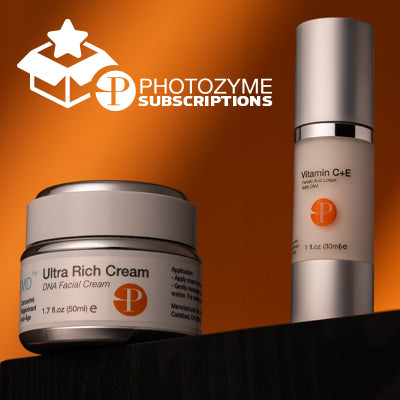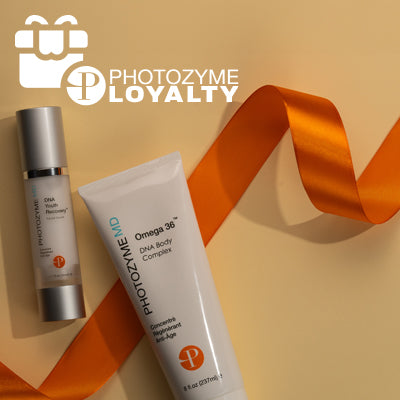
Key Takeaways:
- A Risk You Can't Ignore: Skipping sunscreen significantly increases the risk of skin damage, leading to premature aging, fine lines, wrinkles, and potentially dangerous skin cancers.
- Your Skin’s Best Defense: Daily sunscreen application is crucial for protecting the skin from UVA and UVB rays, preventing not only immediate effects like sunburn but also long-term issues such as DNA damage and loss of skin elasticity.
- UV Exposure: Environmental factors such as altitude, geographical location, and reflective surfaces can greatly impact UV exposure, making sunscreen an essential component in any skincare routine regardless of the weather or time of year.
It’s crucial.
Sunscreen is a shield for our skin, protecting it from the invisible and substantial effects of the sun's ultraviolet (UV) rays. Despite widespread awareness, many still overlook the importance of sunscreen in their daily skincare routine.
At Photozyme, we’re redefining skincare with our groundbreaking approach to repairing and protecting your skin at the cellular level. Leveraging innovative DNA repair enzymes and scientifically advanced formulas, our products combat the visible signs of aging while addressing the root causes of skin damage. Each product is meticulously crafted to deliver transformative results, from reversing fine lines and wrinkles to restoring hydration and vitality.
In this article, we’ll explore the significant effects of not wearing sunscreen, including its immediate and long-term impacts on your skin, daily sun protection, and how innovative skincare solutions like Photozyme's products can help mitigate sun damage and maintain healthy, youthful skin.
Understanding Sunscreen And Its Importance
Sunscreen is formulated to absorb or reflect some of the sun's UV rays, helping to prevent these rays from reaching the skin. Two types of UV rays are particularly harmful to the skin: UVA and UVB.
- UVA Rays can penetrate the skin more deeply, leading to signs of aging such as wrinkles and fine lines.
- UVB Rays: They are primarily responsible for sunburn and can play a significant role in developing skin cancer.
Broad-spectrum sunscreens are designed to protect the skin from UVA and UVB rays, offering a shield against sunburn, premature aging, and skin cancer risk.
- Cumulative Sun Damage: Each unprotected exposure to the sun can add up over time, contributing to chronic skin conditions and increasing the risk of skin cancer.
- Long-Term Effects Of UV Exposure: In addition to the immediate effects, such as sunburn, the long-term consequences include significant changes in the skin's texture, elasticity, and overall appearance.
- Premature Aging: Premature aging, characterized by wrinkles, fine lines, and hyperpigmentation, is often exacerbated by repeated sun exposure without adequate protection.
Skipping Sunscreen: Immediate Effects On The Skin
Even for a day, skipping sunscreen can have immediate effects on the skin that go unnoticed by the naked eye but can accumulate significant damage over time. Understanding these effects is crucial to appreciating the importance of daily sunscreen application as part of a comprehensive skincare regimen.
The Risk Of Sunburn
Not wearing sunscreen increases your risk of sunburn. Ultraviolet (UV) rays from the sun can cause the skin to become red, inflamed, and sore within just a few hours of exposure. Sunburn accelerates skin aging and significantly raises the risk of skin cancer.
Collagen Breakdown And Premature Wrinkles
UV exposure can lead to collagen breakdown in the skin, prematurely developing fine lines and wrinkles. Photozyme LLC recognizes the importance of combating these signs of aging, which is why products like the DNA Youth Recovery Facial Serum are formulated to help reduce the appearance of fine lines and wrinkles and support the skin's natural repair processes that can be hindered by UV damage.
Uneven Pigmentation And Dark Spots
Exposure to UV rays without protection also causes uneven skin pigmentation, leading to dark spots and discoloration. This hyperpigmentation is a direct result of the skin attempting to protect itself from further harm by increasing melanin production, which, paradoxically, can make some skin concerns more pronounced, such as the appearance of age spots or freckles.
Dehydration And Dullness
Dehydration is another immediate concern when sunscreen is skipped. The sun's heat dries out areas of unprotected skin and depletes the skin's natural lubricating oils. This can lead to a dull, dry, and aged appearance, emphasizing the importance of hydration alongside protection. Products like Photozyme's Ultra Rich Cream can help to intensely hydrate and soothe skin exposed to the sun, providing an extra layer of nourishment and repair.
Sun Damage Beyond The Visible: Cellular Level Impacts
While the immediate effects of not wearing sunscreen, such as sunburns and tanning, are widely recognized, the consequences of UV exposure extend far beyond what meets the eye. At the cellular level, unprotected exposure to the sun's ultraviolet (UV) rays can lead to profound and lasting damage, affecting the skin's health and appearance in ways that may not be immediately apparent.
DNA Damage And Premature Aging
One of the most significant effects of not wearing sunscreen is the potential for DNA damage within skin cells. UV radiation, particularly UVA and UVB rays, can penetrate the skin, leading to mutations in the DNA of skin cells. Over time, this damage can accumulate, potentially leading to skin cancers, including melanoma, basal cell carcinoma, and squamous cell carcinoma. In addition to the serious health implications, DNA damage is a primary driver of photoaging, manifesting as wrinkles, fine lines, and loss of skin elasticity. Such signs of premature aging are often the result of years of accumulated sun exposure without adequate protection.
Immune Suppression
Unprotected sun exposure can also compromise the skin's immune function. UV radiation has been shown to alter the activity and distribution of specific cells in the skin, which are responsible for triggering immune responses. This impairment can reduce the skin's ability to protect against infections and exacerbate the severity of sunburns and allergic reactions. Not wearing sunscreen weakens the skin's defense systems and could leave the skin more vulnerable to various issues, including inflammatory responses and slower healing processes.
Disruption Of Skin Barrier Function
The outermost layer of the skin, known as the stratum corneum, protects the underlying tissues from environmental aggressors. Prolonged or repeated exposure to UV rays without protective sunscreen can weaken this barrier function, leading to increased moisture loss and dehydration. This disruption can make the skin more prone to irritation and sensitivity and negatively impact its ability to retain vital nutrients and hydration. As a result, maintaining optimal skin health and appearance becomes increasingly challenging.
Environmental Factors Influencing Sun Damage
Understanding the environmental factors that influence sun damage is crucial when discussing the effects of not wearing sunscreen. Sunlight consists of ultraviolet (UV) rays, the primary cause of skin damage from sun exposure.
However, several environmental factors significantly affect the intensity and potential for damage from these rays:
- Altitude Increases UV Intensity: Higher altitudes expose the skin to more UV radiation due to thinner atmospheres, making sunscreen essential in mountainous regions.
- Geographical Location Matters: Regions closer to the equator receive stronger and more direct UV rays year-round, increasing the necessity for vigilant sunscreen use.
- Peak Hours Amplify Risks: UV radiation is most intense between 10 a.m. and 4 p.m., when the sun’s rays reach the Earth at a sharper angle, heightening the risk of skin damage.
- Cloud Cover Doesn’t Eliminate Danger: Up to 80% of UV rays penetrate clouds, meaning sunburn and cumulative skin damage are still risks on overcast days.
- Reflective Surfaces Increase Exposure: Water, sand, snow, and concrete reflect UV rays, amplifying sun exposure and underlining the need for sunscreen in such environments.
Choosing The Right Sunscreen: A Comparative Guide
Choosing the right product is paramount to mitigate the effects of not wearing sunscreen. With many options available, deciding which sunscreen best suits your skin's needs can be overwhelming.
Here, we'll provide a comparative guide to help you navigate through your choices, focusing on key factors such as SPF rating, broad-spectrum protection, and formulation:
SPF Rating
The Sun Protection Factor (SPF) measures how well a sunscreen protects your skin from UVB rays, the radiation that causes sunburn and contributes to skin cancer. While no sunscreen can block 100% of the sun's rays, higher SPF ratings offer more excellent protection. For daily use, dermatologists recommend sunscreen with at least SPF 30, which blocks approximately 97% of UVB rays. Consider an SPF 50 or higher product for prolonged outdoor activities for protection.
Broad-Spectrum Protection
Not all sunscreens are created equal regarding the spectrum of protection. Broad-spectrum sunscreens are formulated to shield your skin from both UVB and UVA rays. UVA rays penetrate the skin more deeply than UVB. They are primarily responsible for premature skin aging and wrinkling (photoaging) and play a significant role in developing skin cancer. When selecting a sunscreen, look for the "broad-spectrum" label to ensure comprehensive protection against the sun’s harmful effects.
Formulation Types
Sunscreen comes in various formulations, each catering to different skin types and preferences. The most common types include lotions, creams, gels, sticks, and sprays.
- Lotions & Creams are ideal for dry skin, providing hydration and protection. They are also well-suited for use in large areas of the body.
- Gels work best for hairy areas like the scalp or male chest.
- Sticks are perfect for targeted applications, such as around the eyes.
- Sprays are convenient for quick application and reapplication, especially for children or hard-to-reach areas. However, applying enough spray sunscreen to achieve the SPF’s full benefit is crucial, and it should be rubbed into the skin evenly.
Final Thoughts
The risks associated with neglecting sunscreen protection are as clear as daylight. The cumulative effects of not wearing sunscreen range from premature aging to dangerous skin cancers and underscore the importance of incorporating sunscreen into our daily skincare routine. Beyond its immediate protective capabilities, sunscreen plays a vital role in maintaining the integrity and youthfulness of our skin over time.
At Photozyme, we understand the significance of comprehensive skincare solutions because they need to address the root causes of skin concerns, including damage incurred from sun exposure. Integrating our advanced skincare products into your regimen protects your skin from harmful UV rays and contributes to its long-term health and vitality.
Read also:
- How Often Should You Reapply Sunscreen: Maximum Protection
- What Is SPF? Understanding Sun Protection
- What SPF Should You Use? A Guide To Choosing The Right Sunscreen
Frequently Asked Questions About Effects Of Not Wearing Sunscreen
Why is sunscreen important?
Sunscreen plays a critical role in protecting the skin from harmful Ultraviolet (UV) rays that cause sunburn, skin aging, and increased risk of skin cancer. It acts as a shield, preventing UV radiation from penetrating the skin, safeguarding your skin's health, and preserving its youthful appearance.
What happens if I skip sunscreen?
Skipping sunscreen can lead to immediate and long-term effects on your skin. In the short term, it can result in sunburn and skin irritation. Over time, recurrent exposure to the sun without protection accelerates skin aging, causing fine lines, wrinkles, and age spots. It also significantly increases the risk of developing skin cancer.
Is sunscreen necessary on cloudy days?
Yes, sunscreen is necessary on cloudy days. Up to 80% of UV rays can penetrate clouds, meaning your skin is still at risk of UV damage even when the sun isn't visible. Applying sunscreen, regardless of the weather, is crucial for continuous skin protection.
Can skipping sunscreen lead to skin cancer?
Regularly skipping sunscreen increases your skin's exposure to UV radiation, increasing the risk of skin cancers, including melanoma, squamous cell carcinoma, and basal cell carcinoma. Consistent use of sunscreen with adequate SPF is recommended to lower this risk.
Can I get a sunburn even when it's cold outside?
Yes, it is possible to get a sunburn even when it’s cold outside. UV rays can reflect off surfaces like snow, ice, and water, increasing the risk of sunburn. Wearing sunscreen year-round is important, especially when participating in outdoor winter activities.
How does sunscreen prevent skin aging?
Sunscreen protects the skin from UV radiation, which is a leading cause of premature skin aging. By blocking these harmful rays, sunscreen aids in preventing the degradation of collagen and elastin, which are essential for maintaining the skin’s firmness and elasticity, thereby reducing the appearance of fine lines and wrinkles.




